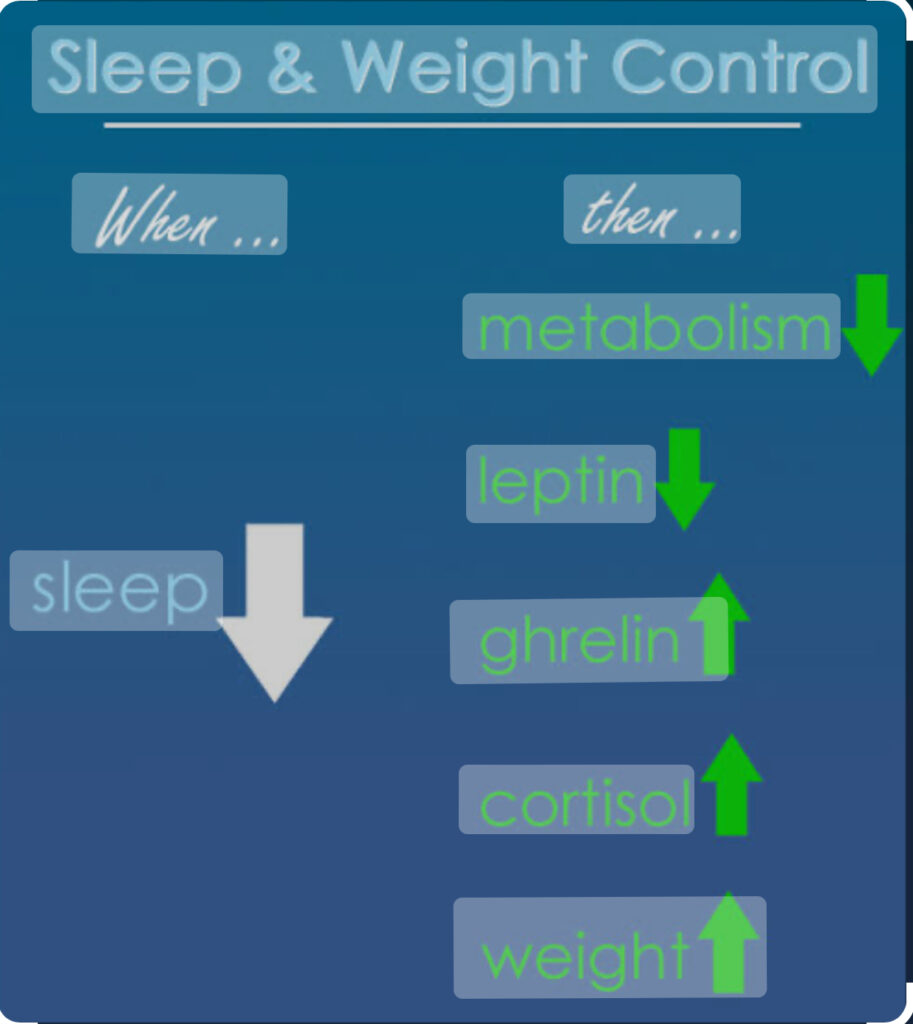In the hustle and bustle of modern life, sleep often takes a backseat to our busy schedules. With work, social commitments, and endless distractions vying for our attention, it’s not uncommon for many people to skimp on sleep, getting less than the recommended 7 hours per night. While the immediate effects of sleep deprivation are well-known – grogginess, decreased concentration, and irritability – what’s lesser known is its profound impact on our waistlines.
Recent research has shed light on the intricate relationship between sleep and weight gain, revealing that getting less than 7 hours of sleep a night can significantly contribute to packing on the pounds. But how exactly does this seemingly innocuous habit lead to weight gain?
To unravel this mystery, we need to delve into the complex interplay between sleep, hormones, and metabolism. One key hormone affected by sleep deprivation is leptin, often referred to as the “satiety hormone.” Leptin signals to our brains that we’re full, helping regulate appetite and prevent overeating. However, studies have shown that sleep deprivation disrupts leptin levels, leading to decreased satiety and increased hunger. Consequently, individuals who are sleep-deprived are more likely to consume extra calories, contributing to weight gain over time.

To unravel this mystery, we need to delve into the complex interplay between sleep, hormones, and metabolism. One key hormone affected by sleep deprivation is leptin, often referred to as the “satiety hormone.” Leptin signals to our brains that we’re full, helping regulate appetite and prevent overeating. However, studies have shown that sleep deprivation disrupts leptin levels, leading to decreased satiety and increased hunger. Consequently, individuals who are sleep-deprived are more likely to consume extra calories, contributing to weight gain over time.
On the flip side, inadequate sleep also impacts another hormone crucial for weight management: ghrelin, known as the “hunger hormone.” Ghrelin stimulates appetite, encouraging us to eat. When we don’t get enough sleep, ghrelin levels spike, intensifying cravings and making it harder to resist unhealthy food choices. This hormonal imbalance sets the stage for overeating and weight gain, as our bodies seek to compensate for the energy shortfall caused by sleep deprivation.

But the effects of sleep deprivation on weight gain don’t stop there. Beyond hormonal imbalances, insufficient sleep can also disrupt our metabolism, the body’s engine for burning calories. Research indicates that sleep-deprived individuals may experience a slowdown in metabolism, making it harder to burn off consumed calories. This metabolic sluggishness further compounds the weight gain associated with sleep deprivation, creating a vicious cycle that’s challenging to break.
Moreover, the consequences of sleep deprivation extend beyond hormonal fluctuations and metabolic disruptions. Studies have shown that sleep deficiency can impair decision-making processes, particularly those related to food choices. When sleep-deprived, we’re more likely to opt for high-calorie, low-nutrient foods, succumbing to cravings and impulse eating. This cognitive impairment further exacerbates the link between sleep deprivation and weight gain, amplifying the risk of unhealthy dietary habits and excess calorie consumption.
In light of these findings, prioritizing adequate sleep must become a cornerstone of any effective weight management strategy. By aiming for at least 7 hours of quality sleep each night, we can support hormonal balance, optimize metabolism, and enhance our ability to make healthier food choices. Incorporating sleep hygiene practices, such as establishing a consistent bedtime routine, creating a comfortable sleep environment, and limiting exposure to electronic devices before bed, can help promote restful sleep and mitigate the risk of weight gain.
Ultimately, understanding the profound impact of sleep deprivation on weight gain empowers us to make more informed lifestyle choices. By recognizing the critical role that sleep plays in regulating appetite, metabolism, and cognitive function, we can prioritize sleep as a non-negotiable aspect of our overall health and well-being. So, let’s unlock the link between sleep and weight gain, embracing the transformative power of a good night’s rest in our journey towards a healthier, happier life.






